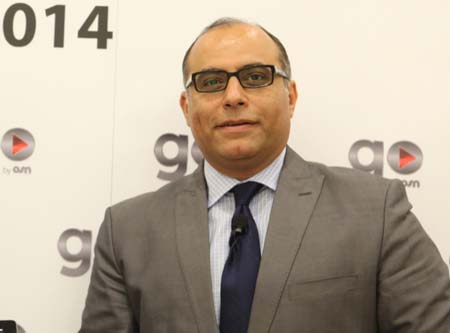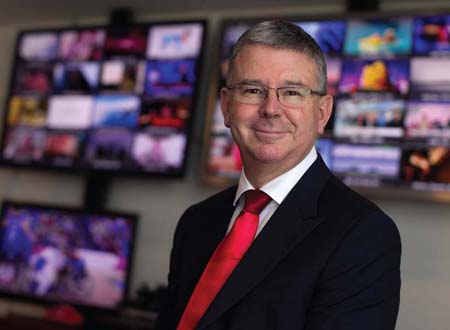What were your achievements in 2012? 2012 is the biggest year of growth that OSN has ever witnessed and from a development perspective, we did a number of things. Late in 2011, we launched our first Arab language channel OSN Yahala. It has soon become Number 2 among the 108 channels we carry. We invested […]

What were your achievements in 2012?
2012 is the biggest year of growth that OSN has ever witnessed and from a development perspective, we did a number of things. Late in 2011, we launched our first Arab language channel OSN Yahala. It has soon become Number 2 among the 108 channels we carry. We invested in and launched OSN Play and OSN Plus HD, two very powerful technology platforms that we spent a lot of investment in creating, and launched one in March and the other in September. Play is at the forefront of platforms.
We are very proud of our technology department, led by Mark Billinge and his team and the achievement in creating those platforms was huge. 2012 really consolidated our position as the premier pay-TV platform in the region. These two landmark technology platforms will take us forward into the digital age like no one else in the region.
What lies ahead in 2013?
2013 will see us building on the developments of the platforms that we created in 2012. So you will see continued advancement at OSN Play. You wont just see a world-class pool system which is what it is today, where consumers can choose a vast array of content and pull it to their screens. We will also create push technologies within that to allow the consumer to do far more things with their box.
We will launch electronic versions of their TV guide that will allow the consumer to control their viewing through their tablet or smart phones.
In short, we will continue to enhance the consumer experience to make certain that the OSN customer receives seamless content and see it first on OSN before FTA.
Any statistics you can share on subscription numbers?
In terms of the business growth, we closed out technical piracy in the end of 2010 with the Conditional Access (CA) swap and that investment was a huge USD 55 million investment, which paid back in inside of a year. So in terms of ROI, that was a huge success. In 2011 and 2012, that shut down piracy and allowed us to accelerate the business. We saw more than 30% growth in terms of our subscriber base in 2012 alone. After 18 years of pay TV in the region, to have added more than 30% of subscribers is a big feat, in my opinion. That has been the result of a combination of our focus on premium content and creating a consumer proposition.
We hear you have had a huge increase in subscriptions in Egypt this last year?
When OSN was created in 2009, we were not able to do business in Egypt for the first couple of years because of some regulatory issues. So whilst the rest of the region took off, we were looking to see how we could operate in Egypt and that materialised in 2011. In 2011/2012, we were able to increase our growth in business in Egypt, the likes of which we hadnt been able to do for many years. So yes, we are seeing rapid acceleration. It is our fastest growing market.
Do you not have any plans to have South Asian content on OSN?
We certainly recognise the size of the South Asian market, which is about 60% of the population here. We are very interested in acquiring South Asian content and have been approached regularly by the content providers who sit on other platforms.
The challenge, however, is that there is significant piracy in the distribution of DTH platforms out of India that can be received here and obviously, they are significantly cheaper because of the lower costs and the price points in India. Now, until the economics of that illegal business is challenged, it is very difficult to compete with that. Even the platforms that are focusing on the South Asian market are economically challenged. So, we are interested in that market in both entertainment and sport as there is opportunity there, but as we have done with other disapora, we shall look at how we can cater to that market and how regulators will potentially clamp down on illegal distributors outside of that region.
Why did you choose a career in television?
I went to a school that had a fairly advanced AV department and I got involved in every school event that happened. We used to do outside broadcast, and had a camera studio set-up that we could roll around the school. We got engaged in the joy of being able to create. So, at 15, I decided I wanted to work in television and proudly came and told my parents that. It came as a shock to them, but the advice from my parents was it doesnt matter what you do in life as long as you do it properly. I have held that dear throughout my career.
I was fascinated by TV. At my first job, which was in television, the head of cameras, who employed me told me that we are in the business of creating illusions and thats what we do in television. I like the fact that we can create something and have the privilege of going into peoples living rooms, and the fact that people trust us.
That inspired me and motivated me to want to work in an industry where we had access to everybodys living rooms.
When did you make the shift from being a cameraman to a manager?
When I was at Sky, where I eventually worked for 14 years, my employer took a very strong position in investing in people just as we do here. They saw a greater role for me in the executive team, and afforded me a business school education.
To go back a bit in time, I started my career at Sky London as the head of Sky News camera department. Then, from there, I moved on to become head of operations and looked after all the technical infrastructure at Sky News.
Then I became head of operations for the whole of Sky.
When Sky was expanding into sports production, we had a significantly large production facility, a massive operation and I had the pleasure of running the department that managed all of that.
It was then that Sky sent me to business school [Harvard] for an accelerated MBA.
I hear you have also initiated several training programmes at OSN?
We have engaged in training and are investing more in training. We have introduced a wide range of training schemes which we will continue to develop. One of them is the BBC training for technical skills in relation to our engineering and operations departments.
We are also investing in employee development programmes for other aspects of the business.
Which department requires the most investment at OSN?
Our biggest spending is on content. In the next couple of years, we shall invest a billion dollars to acquire and commission content. Our second biggest spend is on technology. We will continue to innovate. Capital investments are significant.
Are you a phone addict?
I am not obsessed by it but smart phones are like electronic tagging devices, the ones that they give to prisoners who are just released from the prison to keep a tab on them. Its a great device and we will probably struggle to survive without them but I dont let them ruin my life.
Could you share one exclusive piece of news with our readers?
In Q2 2013, we shall be refreshing the look and feel of our brand again. We have channelled significant money to create a new look and feel for our network.
Which are your two biggest markets for 2013?
Our biggest market remains the UAE. Our two biggest growth markets are Saudi Arabia and Egypt but we see consistent growth particularly in the GCC. Saudi Arabia will continue to accelerate and surpass the UAE.














































































